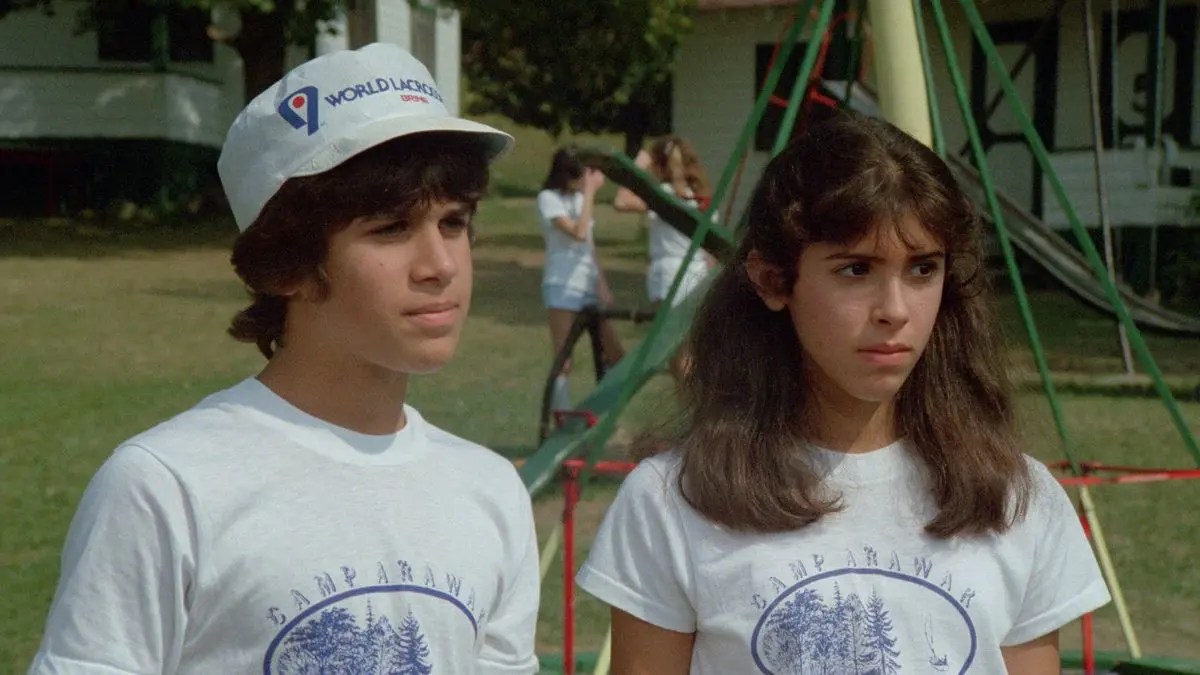40 Years Later, ‘Sleepaway Camp’ Is Still Controversial Yet Thought-Provoking
Angela's story, and all its implications, are still being talked about decades later.

It’s the 40th anniversary of Sleepaway Camp, and even four whole decades later, people are still talking about this film. On the surface, the film is standard horror fare: Angela (Felissa Rose) a shy teen girl, and her gregarious cousin Ricky (Jonathan Tiersten) attend summer camp, where a mysterious slasher is killing campers and staff. What keeps the film from being just another Friday the 13th ripoff? Its iconic twist ending (spoiler alert!) reveals that the Final Girl is actually the killer and is also a transgender girl. This ending has only become more controversial in the decades since its release, leading to much debate over what the film’s true meaning is, or if it should be watched at all.
***Trigger Warning: this article discusses transphobia, true crime, and sexual assault. Proceed with caution.***
What critics say about Sleepaway Camp
Many critics point out how the film’s twist directly demonizes trans people, treating them as shocking and grotesque. The film ends on a freeze frame of Angela’s naked body, with full frontal nudity and a contorted expression. That ending is probably what the film is best known for (apart from the eternal line “eat sh*t and live”).
Unfortunately, this is a common trend in horror, mainly due to the genre taking “inspiration” from the coverage of real-life killers. Ed Gein was incorrectly reported by the press as transgender, a misconception that has led to many horror antagonists such as Norman Bates, Leatherface, and Buffalo Bill all engaging in some form of cross-dressing. Angela the killer camper is, unfortunately, another character who is part of that long-standing stereotype.
For many viewers, Angela reinforces negative stereotypes about trans people being predators or “tricking” people by hiding their identity. These are stereotypes that the fandom does help to perpetuate in some ways. One of the most popular TikToks for the film features a scene with Angela and her love interest Paul, with the caption saying “The people who don’t know (smiling hearts emoji)? The people who do know (nauseous emoji)?.”
Defenders who love the film
The film has its defenders, including some in the LGBTQ+ community. Trans actress, performer, and activist Calpurnia Addams acknowledges the film is transphobic but also notes that “Angela is not even really trans—I mean, there’s no back story saying that she wanted to be a female … You can force somebody to change their body like that, but your gender is in your soul, whatever you force the body to do.”
FlowJournal similarly argues that “Sleepaway Camp is a film about the horror of being forcibly and incorrectly gendered by others” and that “makes Sleepaway Camp different from classically transmisogynistic texts that portray trans women as ‘deceptive’ agents seeking to pass as cisgender.”
Unfortunately, the sequels undercut that message by having Angela go through gender confirmation surgery but still killing people. However, some fans also defend that choice, as they feel it shifts Angela’s motive for her murderous tendencies away from her transition.
For some queer fans, Angela’s experience is surprisingly resonant. She is mocked for being less feminine than the other girls and is relentlessly bullied by people who find her to be strange and different. She also constantly watches the girls at her cabin; some argue out of gender envy, others argue because she is attracted to women but doesn’t know how to express her desires. It helps that Angela herself is shown to be very sympathetic, and even justified, in some of her actions (her first victim is the camp cook who attempts to molest her).
The film itself also engages in some subversion of its portrayal of sexuality and gender. Angela’s father is shown to be in a loving relationship with a man before their deaths and the boys of the Sleepaway Camp are dressed in revealing short shorts and crop tops, same as the girls. Still, it’s important to acknowledge that just because something is subversive, doesn’t mean it has aged well or that it doesn’t punch down.
It’s a bit like how Laverne Cox playing Dr. Frankenfurter did not erase the transphobia baked into the text of The Rocky Horror Picture Show.
Some things to keep in mind when watching
That doesn’t mean we can’t still enjoy the film. Dead Meat’s James A. Janisse laments the fact that the only thing people remember from the film is the twist ending. Especially when there are SO many other wild elements in the film, like the needlessly long baseball game or the water balloon fight on the roof of a cabin.
The focus on gender representation in the film has also allowed other aspects of the film to go under-analyzed, like the questionable age differences or predatory actions of many characters, including Angela’s love interest, who repeatedly crosses her boundaries.
But being an active watcher and understanding how media can affect your perception of marginalized groups is a vital skill and one that is unfortunately undervalued in the current film–going culture.
As Joan Ford explained on the Dead Meat podcast, “So long as we acknowledge what has aged poorly and is problematic about these movies, we can still appreciate them for the thing we’ve always appreciated about them.”
Trying to deny something is problematic does more harm than good, especially when being told by the group it directly demonizes.
(featured image: United Film Distribution Company)
Have a tip we should know? tips@themarysue.com